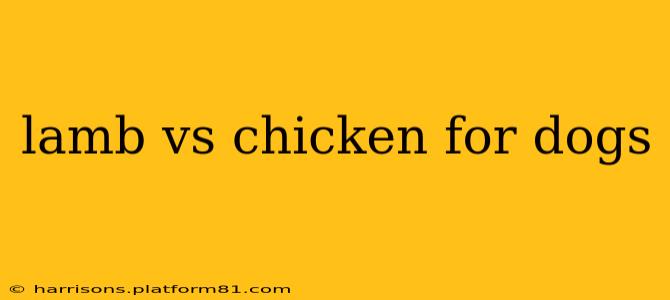Choosing the right protein source for your canine companion is crucial for their health and well-being. While both lamb and chicken are popular choices, understanding their nutritional profiles and potential benefits can help you make an informed decision. This comprehensive guide delves into the nuances of lamb versus chicken for dogs, addressing common queries and offering expert insights.
Is Lamb Better Than Chicken for Dogs?
There's no single definitive answer to whether lamb is "better" than chicken. Both are excellent sources of protein, essential for muscle building, tissue repair, and overall health. However, they differ in their nutritional composition and may be more suitable for certain dogs than others. The ideal choice depends on your dog's individual needs, sensitivities, and any existing health conditions.
What Are the Benefits of Feeding My Dog Lamb?
Lamb is a lean protein source, relatively low in fat compared to some other meats. This makes it a good choice for dogs prone to weight gain or those with pancreatitis. Furthermore:
- Highly Digestible: Many dogs find lamb easier to digest than chicken or beef, making it a suitable option for dogs with sensitive stomachs or digestive issues.
- Rich in Nutrients: Lamb is packed with essential amino acids, iron, zinc, and vitamin B12, all vital for a dog's overall health and development.
- Good for Allergies: For dogs with chicken or beef allergies, lamb often provides a suitable alternative protein source. However, always consult your veterinarian before switching your dog's diet, especially if they have allergies.
What Are the Benefits of Feeding My Dog Chicken?
Chicken is a widely accepted and readily available protein source for dogs. Its benefits include:
- Affordable: Chicken is generally more affordable than lamb, making it a budget-friendly option for many pet owners.
- Lean Protein: Similar to lamb, chicken is a lean protein source, beneficial for maintaining a healthy weight.
- Easily Accessible: Chicken is widely available in pet food stores and supermarkets, making it convenient to incorporate into your dog's diet.
- Versatile: Chicken can be easily incorporated into homemade dog food or added to commercial kibble.
Is Lamb More Expensive Than Chicken for Dogs?
Yes, generally lamb is more expensive than chicken. This is due to factors such as supply and demand, and the overall cost of lamb production. This price difference is a significant consideration for many pet owners.
Can Dogs Be Allergic to Lamb?
While less common than chicken allergies, dogs can indeed be allergic to lamb. Symptoms of a lamb allergy can include skin issues (itching, redness, hot spots), digestive problems (vomiting, diarrhea), and even respiratory issues. If you suspect a lamb allergy, consult your veterinarian immediately.
Can Dogs with Chicken Allergies Eat Lamb?
Lamb is often a suitable alternative for dogs with chicken allergies, as they are not cross-reactive. However, it's crucial to introduce lamb gradually into your dog's diet and monitor them closely for any adverse reactions. Always consult your veterinarian before making significant changes to your dog's diet, especially if they have allergies.
Which is Better for a Puppy: Lamb or Chicken?
Both lamb and chicken can be suitable protein sources for puppies. The best choice depends on your puppy's breed, size, and any pre-existing health conditions. Consult with your veterinarian to determine the most appropriate protein source for your growing pup. They can also advise on appropriate portion sizes.
Conclusion: Choosing the Best Protein for Your Dog
Ultimately, the choice between lamb and chicken for your dog hinges on their individual needs and your budget. Both offer excellent nutritional benefits. Consult your veterinarian to discuss the best protein source for your dog, considering their age, breed, health, and any specific dietary requirements or allergies. Remember, a balanced and nutritious diet is essential for your dog's overall health and happiness.
